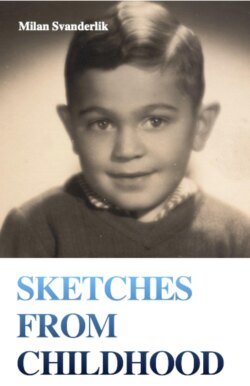Читать книгу Sketches from Childhood - Milan Svanderlik - Страница 8
На сайте Литреса книга снята с продажи.
ОглавлениеCHAPTER 4
THE WORLD BEGINS TO CHANGE
I have a clear recollection of the day when the usual tranquility of our home was disturbed by workmen mounting a set of large loudspeakers on the telegraph pole in front of the house. From that day onwards, day in and day out, we were woken up with loud, martial music interspersed with endlessly repeated speeches and news bulletins, ardent talk that seemed to last for ever. The noise was utterly relentless: it penetrated every wall and could be heard in every room in the house - you could not even savour peace and quiet in the bathroom. The whole of Jiřikov had to endure these broadcasts, onslaughts on the ears that only ended in the evening. Sunday was the sole day when there was peace; on every other day, there was no escaping it. I remember seeing my mother, sometimes in despair but more often moved to anger, as she railed against these broadcasts, calling them just lies and propaganda. My father would often disappear up to the top of the house where, tucked away in the loft and covered with a heavy blanket, he would listen to Yugoslav radio stations, to Radio Free Europe or to other stations in western Europe. I was under strict instructions never to mention these radio broadcasts to anyone, and thus I began to understand that there were some things in life that even honest little boys had to keep secret. Often, after these broadcasts, my parents would discuss the latest news, discussions that sometimes developed into heated arguments.
In addition to the intrusive loudspeakers, there were the workers’ marches that always seemed to have to pass our house. What was strange to me was that they generally paused in front of our gate, when they became suddenly noisier; the reasons for this behaviour I could never comprehend. One day, during one of these noisy, vociferous interludes, one of the marchers threw a stone that crashed into our front door, nearly breaking the glazed panel. Without exception, my parents kept themselves invisible inside the house on these occasions, so as not to provoke further hostility, but I used to observe the marches with both interest and puzzlement. The marchers usually carried large banners and flags, and sometimes what looked like giant pictures. Many years later, from contemporary photographs, I discovered that these were images of Lenin, Stalin and Klement Gottwald, the icons of the Czech Communist revolution.
At some point, though my memory is vague about when exactly, new people moved into the property next to ours and these neighbours would never speak a single word to us. My parents maintained that they were put there to spy on our every move and I was never allowed to go anywhere near them. While the cloistered life I led as a child seemed perfectly normal to me - I had had no other experience, after all - the same could not have been true for my parents; they knew themselves effectively ostracised from the local community. Not that, in Jiřikov, they were the only ones to have been targeted. After the coup, when the Communists took over, the country’s new political masters nationalised all the industries and confiscated the private property of anyone they considered rich. When the new government in Prague decreed that the bourgeoisie should be eradicated from Czech society, this was understood in some provinces as an order to eliminate anyone seen as belonging to that class. The proletariat had won and all those who had been the prime beneficiaries of the ‘old order’ were to be swept away. This was a golden opportunity for old scores to be settled and deep-seated envy to be assuaged: both individuals and entire families would simply disappear overnight. The Communists were determined to wipe the slate clean and anyone who did not support the new order, or who was suspected of harbouring what were now seen as degenerate views, had to be purged from society.
My family’s name was on the list of those under suspicion. Though born in Yugoslavia, my parents were ethnically Czechs and they had latterly acquired full rights to reside in Czechoslovakia; however, they had also clandestinely retained their Yugoslav citizenship. After 1948, almost overnight, they were labelled as outsiders, particularly as this was the time when Yugoslavia’s President Tito chose to navigate a more individual course for his country, declining to follow the political diktats imposed by Stalin on the nations of Eastern Europe, the countries of the Warsaw Pact. Instead, Tito steered Yugoslavia towards what later became known as the League of Non-Aligned Nations. From a Czech Communist perspective, this had to be seen as a betrayal, a move that set a dangerous and infectious precedent in that large area of Eastern Europe now seen as a legitimate sphere of Soviet influence. It is therefore unsurprising that my father’s association with Tito’s Partisans immediately made him a suspect. Ironically, as Yugoslav citizens, we were technically foreigners, and thus we were spared the brutal treatment meted out to many amongst the local Czech bourgeoisie. Having been protected from elimination, we were simply labelled as ‘undesirables’, and we lived under what was effectively house arrest for a number of years. Born on the very day of the coup d’état, I was but a small child and wholly ignorant of what any of these things meant. There is a saying in English that goes: ‘when ignorance is bliss, t’is folly to be wise’; how very true that was for little Milan, growing up in Jiřikov.


